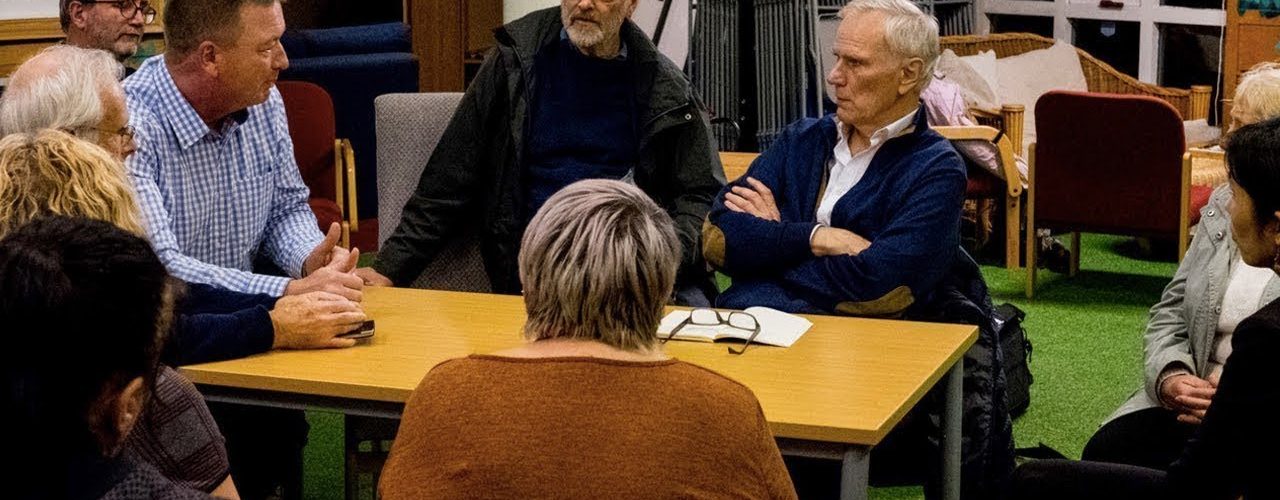The British model since 2010, based on ‘austerity’ can be seen as a transfer of resources from the poor to the relatively wealthy, explains UN Special Rapporteur for Extreme Poverty & Human Rights, Philip Alston discussing his investigation into UK poverty
December 22, 2018
***
LYNN FRIES: It’s The Real News, I’m Lynn Fries. And this is part two of a conversation with our guest, Philip Alston, who’s talking about his work as United Nations special rapporteur on extreme poverty and human rights, specifically his investigation into poverty in the United Kingdom. Philip Alston is an independent human rights expert and a Professor of Law at NYU. Philip Alston, welcome.
PHILIP ALSTON: Thank you.
LYNN FRIES: UK Conservative leader, Margaret Thatcher, famously said “There is no such thing as society.” Comment on that philosophy articulated by Margaret Thatcher as it extends into the current UK Conservative leadership with respect to Social Security, in other words, the new UK benefits system known as Universal Credit.
PHILIP ALSTON: Yes. I think the point that Mrs. Thatcher was trying to make is that individuals are really responsible for looking after themselves, that they shouldn’t expect to be able to turn to “society,” let alone to the government. And I think that’s the philosophy that is in the process of being implemented in the United Kingdom. The idea, generally, is to make welfare highly unattractive in terms of the levels that are available, to make it quite punitive in the sense that you’re really going to have to go through a hard slog in order to qualify for it, you’re going to have to deal with officials who are going to be very paternalistic. There are very draconian sanctions that apply for people who are late for meetings. People who leave any job voluntarily are immediately subject to severe sanctions, and those sanctions can quite easily be ramped up to three years without being eligible to receive any benefits. So the whole thrust is to make any engagement with the welfare system as unwelcome as possible. People just are encouraged to see it as an absolute last resort and something that they will really dread getting into.
LYNN FRIES: Briefly comment on the way successive governments have presided over what’s been a systematic dismantling of the UK social safety net.
PHILIP ALSTON: You had steps taken by the government of Tony Blair, and also that of Gordon Brown, to reduce some of the benefits that were available, you had steps to introduce employment obligations and so on. That was fairly standard. But I think it’s the two governments since 2010 that have really combined to transform the system, the coalition, and then followed by the Conservatives in power on their own.
LYNN FRIES: Explain more about the background to this change of philosophy in policymaking with respect to benefits and what’s driving it.
PHILIP ALSTON: The recent history of welfare policy is important to understand. There was the big global recession back in 2007, 2008. In 2010, a coalition government came to power in the United Kingdom between the Liberal Democrats and the Conservatives. The platform that they adopted called for austerity and called for major changes in welfare. That austerity ended up focusing much more heavily on welfare than on most other areas. It extracted very large amounts of money from the welfare budget, it brought in very far reaching reforms, but in fact, those reforms were not limited in any way to the need to save money. They actually transformed the system itself. So six different benefits were rolled into one new benefit called Universal Credit. The employment obligation was increased so that anyone who is not actually in work has to prove that they are spending 35 hours every week searching for employment, and they’ve got to document that.
Each person has to go to a job center, they have to report to a work coach, they have to go online very regularly and indicate what activities they’ve been undertaking. The benefit levels are cut, there are no benefits now for families with more than two children. In other words, only two children are covered by benefits, any other children are simply not covered. And so, there are a range of measures which have really eaten into the previous fabric that existed of the social welfare state in the United Kingdom. And those measures are driven essentially by an ideology which is that welfare is bad, that government should not be supporting people, and that employment is the answer to all of the problems. So it’s not driven by the need to save money, it’s driven by the desire to get across a particular philosophy of the role of government in relation to the citizen.
LYNN FRIES: Talk about the decision by the UK government to impose a policy of austerity in the post crisis period.
PHILIP ALSTON: Well, first of all it has to be said that there were many governments around the world that were put under pressure by the International Monetary Fund because they had simply run out of money and they were then required to adopt what’s called fiscal consolidation or austerity policies. But in wealthy countries in the West, there was of course no external imposition of austerity. And what you had in countries like the United States or Australia was a decision by the government to stimulate the economy, not to go into austerity. But the British government very deliberately chose that as an option rather than stimulating, and said no, we’re going to have austerity. And the burden of that austerity was placed squarely on the backs of the poor. So many people in Britain see the policy of austerity as basically a transfer of resources, in effect, from the poor to the relatively wealthy. Because of course, taxes were cut at the same time.
The other element that was pursued very strongly by the government since 2010 was to radically reduce spending on local authorities. So in England, local authority spending has fallen by almost 50 percent. What that means is that the local or city councils in places like Newcastle, where I visited, now find themselves only able to fund emergency social protection activities and not to keep maintaining the full range of social protection services that they were previously providing. It also means that they are under so much pressure to raise money that they are closing libraries, they are selling off recreation centers, they are consolidating community centers, they’re selling off public parks, they’re trying to get rid of as many public buildings as possible. Any way to make money to keep the basic services running. And so, what you get then is a level of social protection available from local councils, which used to be really quite important actors in the English context, which is now radically lower than it was eight years ago.
LYNN FRIES: Taking the policy decision to cut local government spending, for example, did those budget cuts result in savings?
PHILIP ALSTON: The savings on local government spending are, I think, in many ways really illusory. Because what happens, of course, is that a lot of the people who are no longer able to get social protection support from councils end up in the emergency rooms in hospitals or in the care of the police or whatever. In other words, if you take services away, people don’t just go away quietly and sit at home, they go into crisis, and money needs to be spent in other ways. So you’re transferring a lot of the problems over to the National Health System and the police and other sources. It’s really a very inefficient way of trying to provide the necessary essential care for the citizenry.
LYNN FRIES: And when you speak to UK Government ministers about all this, what do they tell you?
PHILIP ALSTON: Well, as I said, the Conservative government has a very particular philosophy. One of the issues that came up often when I was speaking to people, particularly about rural areas, is that the privatization of the transport system has meant that services have been closed in a lot of areas, that services have been very significantly reduced in others and that the price of fares has gone up. And so, people in villages around England feel that they are trapped, that they cannot afford to get out of the village, they can’t afford to go to the big towns where the employment centers are and where they need to go for medical and other appointments. This is a real problem. When I raised that with one of the ministers, the response was, “Government doesn’t have an obligation to be providing transport,” which I found very strange, because transport is a basic service, it’s an essential service, particularly for people in rural areas. It’s true that government doesn’t have to provide it itself, but it has to make sure that there are ways in which people can travel, particularly when a lot of the local services are actually being closed down and people need to be able to travel more in order to survive.
LYNN FRIES: And throughout your investigation, what was your sense of the impact of all this on people in the United Kingdom, on UK society?
PHILIP ALSTON: I think I have, of course, got a reasonable understanding of the British lifestyle, having visited Britain on and off from–I think 1976 was the first time I was there, but I’ve been there many times. I have a sense of the way in which British society lives, the sort of image of the solidarity in the countryside, in villages and so on. And I think what we’re seeing with the undermining of a lot of the community institutions, the selling off of properties, the great reduction in the ability of people to get together in community contexts, I think that is changing the basic way of life that most Britons pride themselves on living.
LYNN FRIES: And giving your findings, what do you think it would take to turn the situation around?
PHILIP ALSTON: I think, obviously, it would take a change of government in order to bring in a different philosophy in relation to both benefits and the role of local governments. But assuming there isn’t a change of government, I think that a different approach could very easily be adopted by the present government, which would result in a much better situation. When I was there, I met the then Secretary for Work and Pension, Esther McVey. She resigned a couple of days after I met with her, over Brexit, and was replaced by Amber Rudd. The new Secretary has indicated that she is looking at some changes. Ideally, those would focus particularly on the five to seven week waiting period that should be either eliminated or reduced to a couple of weeks at most. Payments should be made directly to women within households as well as men. The sanctions regime should be changed very significantly, sanctions should be used far less often. And a much more positive mentality should be adopted because that is the way to get people into work. Punishment doesn’t work effectively. And I think there are quite a few changes of that sort that could be made essentially with the stroke of a pen that would make the existing system much more humane and address a lot of the discontent that is out there.
LYNN FRIES: Do you think this discontent played a significant role in the Brexit vote?
PHILIP ALSTON: Most commentators on Brexit have identified the economic insecurity and fears felt by lower income people as one of the key causes. That was attributed in very broad terms to globalization, whatever that meant, which in turn was associated with the European Union. But the reality, of course, is that the austerity policies have nothing to do with globalization or the EU. That was a very British solution to a particular problem. But it did lead to a lot of people in the bottom 20, 30 percent being significantly worse off and feeling much more insecure. The irony is that assuming Brexit goes ahead, even on the best scenario, what we’re now seeing are estimates by the Treasury and others that there will be something like a four percent hit to GDP. That in turn reduces tax receipts, that in turn makes it much more difficult to continue providing even existing levels of service. And certainly, there has been no discussion that I’ve seen of how people already living in poverty are going to be protected in the context of a situation where employment, jobs and other areas are going to be badly hit by the new status.
LYNN FRIES: As we wrap up, and as a concluding thought, comment on your thoughts about the wider implications of your findings concerning UK policy choices and poverty in the United Kingdom.
PHILIP ALSTON: Well, one of the reasons why I wanted to visit the United Kingdom is precisely because it has been a very important leader in terms of policy on a lot of these issues. During World War II, Lord Beveridge was appointed to review the whole system in the UK in relation to social protection and came up with what subsequently was called the Welfare State. That was not a soft welfare state of a socialist sort, it was a hard-nosed welfare state that was based on employment, based on trying to make sure that people were not idle or lazy and so on. But it set the trend in Western Europe for systems that were going to really try to ensure decent health, decent education for all citizens from cradle to grave, as we say.
The changes that have been ushered in since 2010 are themselves quite revolutionary in a sense, because they are rolling back many of the assumptions in the Beveridge approach and replacing that with a very different sort of mentality. I think that’s something that conservatives in the United States, in various other places, are interested in. I think the British model is something that many would like to see in other places, and that’s what made me think that’s important to get a real understanding and appreciation of what the consequences of the new approach in the United Kingdom have been.
LYNN FRIES: Philip Alston, Thank you.
PHILIP ALSTON: Thank you. My pleasure.
LYNN FRIES: And thank you for joining us on The Real News Network.
***
Philip G. Alston is an international law scholar and human rights practitioner. He is John Norton Pomeroy Professor of Law at New York University School of Law, and Chair of the law school’s Center for Human Rights and Global Justice. Philip Alston is the United Nations Special Rapporteur on Extreme Poverty and Human Rights (2014-2020).
Originally published at TRNN



